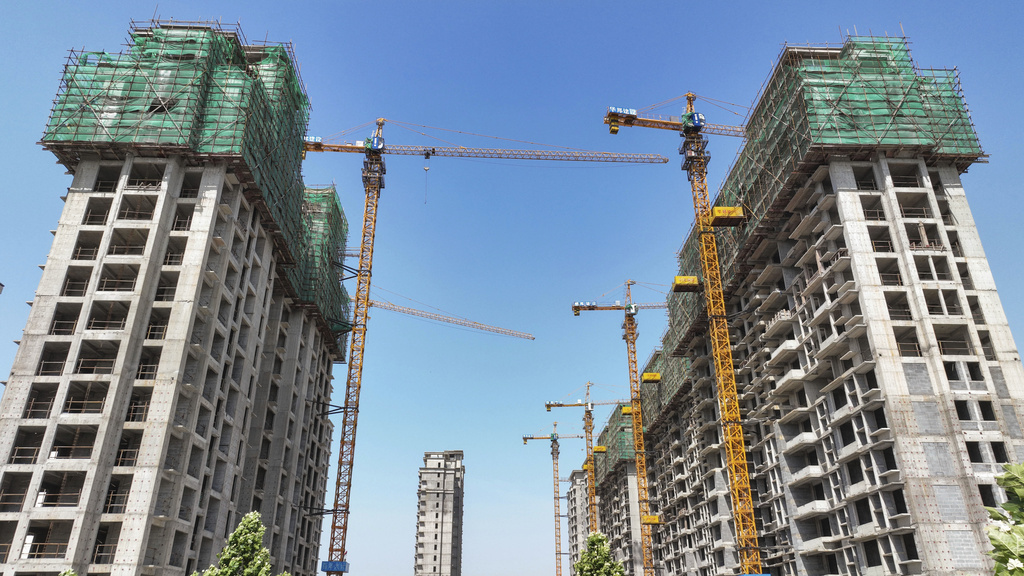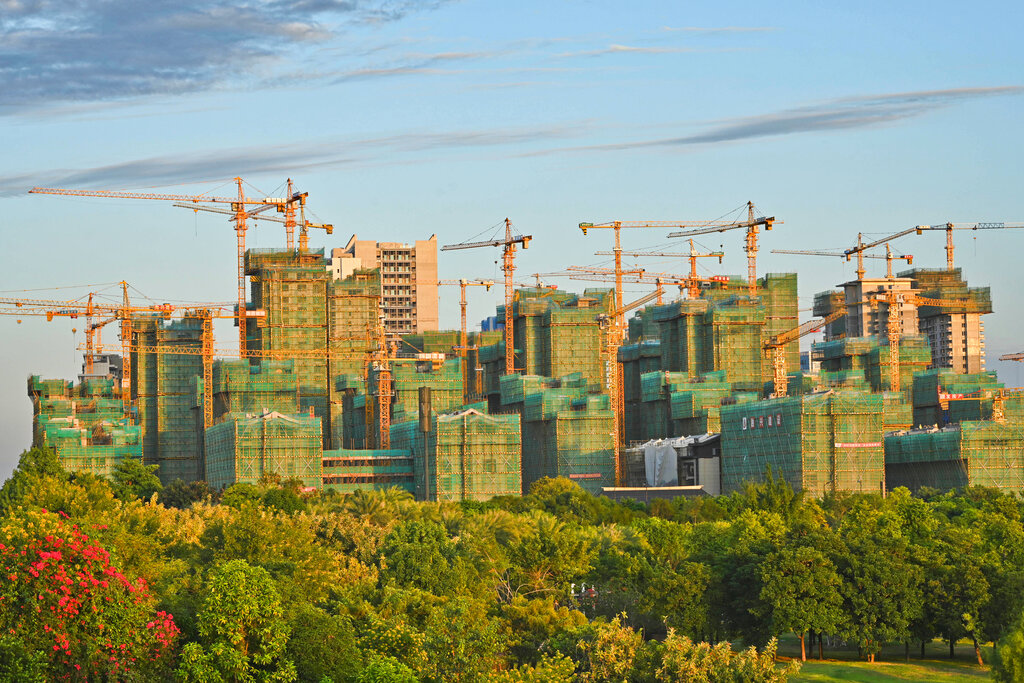
After the turmoil and volatility of the past few years, China property is starting to show green shoots of recovery. But while China developer stocks are up more than 20% from the lows of 2022 as proxied by Hang Seng Mainland Properties Index, bonds are a different story. Not all fund managers have enough conviction to start buying developer debt just yet.
What Happened in China Property?
Three years ago, the Chinese government started wielding regulatory tools to curtail the excessive borrowing that was fueling growth in the property sector. This was in line with the country’s goal to achieve quality, sustainable economic growth while reducing overall debt burdens. As a result, 18-months ago, China’s largest developer China Evergrande Group first announced it was on the verge of defaulting on its massive US$300 billion bond complex.
Home sales stalled as homebuyers fear that troubled developers couldn’t complete new housing projects.
Things now appear to be changing. In the first four months of 2023, residential home sales on the mainland grew by 11.8% year on year. Developers also saw progress in restructuring their financing structure. Last month, Sunac China, which used to be the country’s fourth largest developer by sales, said creditors representing 75% of its US$9.1 billion offshore debt have agreed to its debt-resolution plan.
But even with this string of good news, the bond market is still quite lackluster and jittery. Managers say the issue isn’t just about the number of defaults, but also about what comes after.
Opportunities Are There, But Market Pessimism Is Too
Many of beleaguered property developers have just entered a long-drawn process of restructuring. Jenny Zeng, chief investment officer for Asia fixed income at Allianz Global Investors, thinks sentiment towards the U.S. dollar bonds of property developers remains fragile because of a lack of visibility into future cash flows.
Zeng says: “When it comes to restructuring, it's all fundamental and bottom up. It takes time.” She adds that outcomes from the restructuring process aren’t linear. “Developers now trading at 10 or 20 cents on the dollar will not have the same recovery value, nor will they have the same fundamental credit trajectory.”
In the middle of the market finding the right recovery value, Zeng thinks long-term opportunities emerge, and in Allianz GI’s bond strategies, Zeng only invests in the high-conviction ‘survivors’ through this downturn.
“The coupon is my upside, and my downside is the principle. As these companies have crystallized a restructuring process, it is good for future premium assessment, risk optimization and risk taking. The market dislocation provides longer-term return opportunities.”
Some Managers Want to Avoid All Defaults
Unlike Allianz GI’s Zeng, Andy Suen, co-head of Asia ex-Japan Fixed Income, at Pinebridge Investments, is more conservative.
For Suen, the approach to the China property sector is to avoid all defaults, rather than funding distressed developers, or betting on positive outcomes from the restructuring process. Suen provides several reasons to be wary of names going through a restructuring.
First, he is not optimistic on the restructuring process for very distressed developers. The legal complications in the bond structure and the execution of the restructuring process aren’t favoring offshore investors.
“As we know, the [offshore U.S. dollar-denominated] bonds are ranked behind the onshore liabilities in the restructuring process… We are not comfortable with the asset coverage for these defaulted names.”
He thinks the rescue packages aren’t there to engineer a V-shaped recovery. Rather, the market expects the property sales to be in a L-shaped trajectory, indicating that the home sales will hover at the bottom for a while. To him, this indicates a need for caution in the property development business. “The underlying business operation has not recovered yet, and we think it’s unlikely to recover in the near term,” he says.
Suen expects homebuyers to remain very risk-averse against developers that declare a default. As a result, these companies will continue to underperform in terms of property sales.
Distressed Developers Stay at the Bottom for a While
“There is little excess cash flow from operations to repay creditors, particularly offshore creditors. We are not hopeful about the recovery value for distressed or the defaulted developers,” the Pinebridge manager notes.
According to Suen, developers that declared a default saw home sales down 70 to 90% year on year. He expects the weaker developers in the sector, particularly privately-owned ones, to continue to struggle. “We don't think they are out of the woods yet. The rebound among the state-owned developers was as much as 50 to 60% from a year back, while their privately-owned peers are still suffering a negative growth.”
In terms of property sales by geography, first-tier cities show a trend of stabilization to growth, while low-tier cities are still struggling. Suen believes policy stimulus remains ‘very targeted and selective in certain sectors which do require support’.
“China is likely to maintain a pro-growth policy stance in the coming months, and I think China also has room to do so, given that the CPI is still well below the target, which is very different from the developed markets,” he adds.
Two Types of High-Quality Bonds in China Property
Because of the default fallout and a deep cut in bonds’ market value, junk bonds issued by Chinese property developers only represent roughly 13% of the Asian high yield index as of the end of April 2023. Before the debt crisis, this number stood at 35%. As the investible universe has shrunk, the list of high-quality Chinese property bond issues has also proportionally reduced.
This is expressed in Suen’s Asian high-yield portfolios, which own very few survivor names in this cycle. There are some common characteristics among these names, he says.
For instance, a larger recurring income earned from the investment property portfolio is a point in favor. Suen says: “Developers can pledge the portfolios to obtain financing, whether it's from the onshore bond market or from the banks, and this also reduces the refinancing risk for the offshore bonds.”
He also tends to pick developers that own a sizeable land bank, with the majority of the land coming from the top tier cities, where see more favorable property sales and fundamental outlook.
Defaults are a Crucial Step Towards Market Maturity
Before the freefall, China’s overextended home-building business was ‘systematically important’ for economic growth and systemic stability. This may still be true as the sector bridges and binds banks, small-and-medium enterprises, and the nation’s homebuyers. For bond investors, though, the sector’s meltdown has brought in a new set of metrics in bond pricing.
Allianz GI’s Zeng says: “Was that wrong to think the ‘property market is systemically important?’ No. Even in developed markets like the U.S. or Australia, the property sector is still systemically important. But does that systemic importance translate into zero default? No.”
Zeng believes what happened to the property sector is a reflection of market immaturity. Only going through a crisis like this, the market will have a proper expectation of a normal default cycle and default rate in a cyclical and systemic important industry.
“A good thing about this kind of extreme credit event is that you will get people to rethink about their framework and to redesign the analytical framework to define what is actually high quality or low quality,” she says.












.png)



.jpg)





